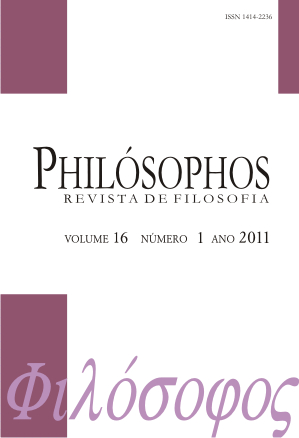STOIC INFLUENCE IN ABELARD'S CONCEPTION OF <em>STATUS</em> AND <em>DICTUM</em> AS <em>QUASI RES</em> (ὡσανεì τινά).
DOI:
https://doi.org/10.5216/phi.v16i1.12437Keywords:
Abelard, stoicism, ontology, logicAbstract
In his work, Peter Abelard (1079-1142) highlights two metaphysical notions, which sustain his logical theory: the status and the dictum propositionis, causing respectively both the imposition (impositio) of universal terms and the thuth-value of propositions. Both expressions refer to peculiar ontological natures, in so far as they are not considered things (res), even if they constitute causes. Nevertheless, neither are they ‘nothing’. Abelard calls them ‘quasi-things’ (quasi res). In the present article, we expound first these two essential notions of Abelardian logic before then trying to find the source of this particular metaphysics. Contrary to some important commentators of Abelard’s logic, who consider there to be a strong Platonic influence in this specific conception, we maintain instead, with support from significant texts and in accordance with Abelardian nominalism, that the main ancestry of the metaphysics of our author is principally that ancient stoicism.Downloads
Downloads
Published
How to Cite
Issue
Section
License
Authors who publish in this journal agree to the following terms:
- Authors retain copyright and grant the journal right of first publication, with the work simultaneously licensed under a Creative Commons Attribution License that allows others to share the work with an acknowledgement of the work's authorship and initial publication in this journal.
- Authors are authorized to enter into separate, additional contractual arrangements for the non-exclusive distribution of the journal's published version of the work (e.g., publishing in an institutional repository or as a book chapter), with an acknowledgement of its authorship and initial publication in this journal.















